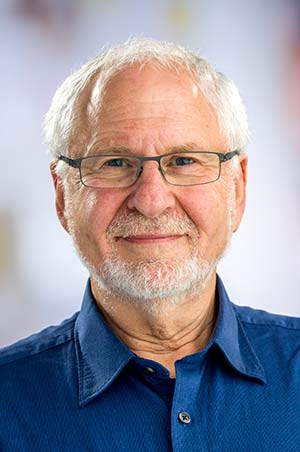Irwin Bernstein, MD
Professor
Translational Science and Therapeutics Division, Fred Hutch
Dr. Irwin “Irv” Bernstein studies how stem cells in the bone marrow form, mature and give rise to all the cells of a person’s blood and immune system. His longstanding goal has been to translate laboratory discoveries into new therapies for people with leukemia and other diseases. An example is the first-ever “magic bullet” drug, or antibody-drug conjugate: gemtuzumab ozogamicin (Mylotarg). The leukemia drug was based on Dr. Bernstein’s fundamental research on blood cell biology, and he was one of its lead developers. His team has also learned how a set of signals called the Notch pathway prompt blood stem cells to multiply. A Fred Hutch spinoff, Nohla Therapeutics, is now building on this discovery to develop off-the-shelf, universal-donor cell therapies. Dr. Bernstein also leads federally funded research training programs for early career scientists at Fred Hutch. For more than 40 years, Dr. Bernstein headed the Pediatric Oncology Program at Fred Hutch and the Division of Hematology and Oncology in the UW Department of Pediatrics.
Clinical Expertise
Dr. Bernstein is an expert in blood cancers, pediatric oncology, and research. He is head of the pediatric hematology/oncology division at Seattle Children's but does not see patients.
Other Appointments & Affiliations
Professor, Pediatrics, University of Washington School of MedicineProfessor, Pediatrics
University of Washington School of Medicine
American Cancer Society Professor
Education
Post-Doctoral Research Fellow: Department of Pathology, University of Washington; 2002-2004
Fellow: New York Cancer Research Institute; 1972-1974
Clinical Fellow (Pediatric Hem-Onc): Children's Hospital and Medical Center; University of Washington; 1971-1973
Research Associate: Biology Branch, National Cancer Institute; 1969-1971
Intern and Resident (Pediatrics): Children's Hospital of Los Angeles; 1967-1969
MD (Medicine): New York University; 1967
BS (Biology): Trinity College; 1963
Research Interests
Dr. Bernstein holds the John R. Hartmann Endowed Chair in Pediatric Oncology/Hematology at Seattle Children’s and is an American Cancer Society professor. His research interests include blood-forming (hematopoietic) stem cells, antibody-targeted therapies for lymphoma and leukemia, and the biology of acute myeloid leukemia (AML). He has been principal investigator of a team investigating immunotherapy for hematologic malignancies, the Children's Oncology Group AML reference laboratory, and of the Progenitor Cell Biology Consortium studying the biology of hematopoietic stem cells.
Research in the Bernstein lab has primarily focused on developmental aspects of blood cell formation, maturation and diversification (hematopoiesis), with the specific goal of developing novel therapies. One set of studies identified maturation-associated proteins on AML cells. They advanced an antibody-based strategy to target one of these proteins (antigens), known as CD33. This led to the development of Mylotarg®, a CD33-targeting antibody that carries a lethal drug to kill AML cells; Mylotarg is now FDA-approved for treating patients with AML.
More recent studies have focused on the role of the “Notch” and interacting molecules (known as the Notch “signaling pathway”). The Bernstein team has shown that Notch signaling can enhance self-renewal of pluripotent hematopoietic stem cells. Their findings led to a novel approach for engineered Notch ligand-induced expansion of stem cell numbers from umbilical cord blood exposure. This method produced a substantial increase in the number of CD34+ stem cells that were able to replenish the blood systems in transplanted mice. In clinical trials led by Colleen Delaney, Notch-expanded stem cells provided rapid early engraftment. A randomized study is currently testing if expanded, “off-the-shelf” cord blood precursors decrease morbidity and mortality during the neutropenic period in patients undergoing umbilical cord blood transplantation as well those undergoing intensive chemotherapy for AML and contribute to improvement in overall survival.
